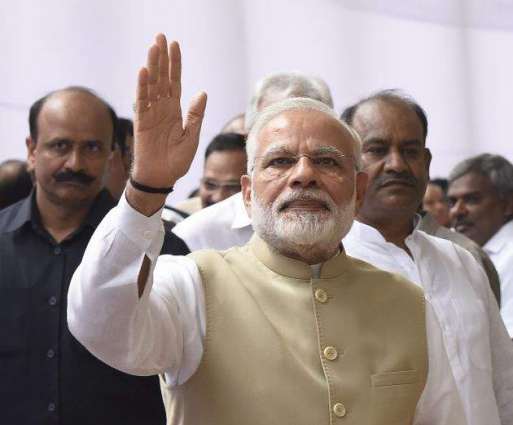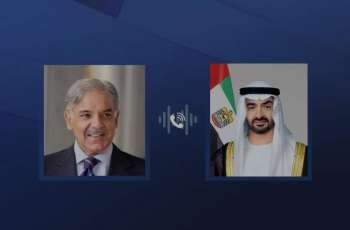The flared up tensions with Pakistan and divisions among the opposition are significant factors influencing the last general elections in India, which, according to the exit polls, are likely to end with a victory of the ruling coalition led by Indian Prime Minister Narendra Modi's Bharatiya Janata Party (BJP), experts told Sputnik
MOSCOW/NEW DELHI (Pakistan Point News / Sputnik - 23rd May, 2019) The flared up tensions with Pakistan and divisions among the opposition are significant factors influencing the last general elections in India, which, according to the exit polls, are likely to end with a victory of the ruling coalition led by Indian Prime Minister Narendra Modi's Bharatiya Janata Party (BJP), experts told Sputnik.
The Indian general elections were held in seven stages from April 11 to May 19, with around 900 million eligible voters choosing 543 members of the country's legislature, Lok Sabha. The BJP's main rival was the Indian National Congress party, led by Rahul Gandhi, a member of one of the most influential political families in the country the Nehru-Gandhi family. In 2014, the party secured only 44 seats in the parliament.
The vote came to a close on Sunday, with exit polls suggesting that the BJP-led National Democratic Alliance (NDA) was poised to win between 277 and 365 seats a clear majority given that 272 seats are necessary for a party to form a government. Some see the elections as a referendum on Modi's five-year rule after his party secured a majority of 282 seats in the legislature back in 2014.
Vote count will begin on Thursday morning, with the final results likely to be out by late evening.
Zoya Hasan, professor emeritus at Jawaharlal Nehru University (JNU) in New Delhi, told Sputnik that it would be wrong to completely trust the exit polls, as there had been many cases when polls were proved wrong.
"Exit polls indicate trends ... It does look like there is wide support for him," she, however, noted.
Hasan's skepticism about the accuracy of the exit polls was echoed by Prerna Singh, Mahatma Gandhi Assistant Professor of Political Science and International Studies at Brown University in Providence, Rhode Island.
"We just have to wait and watch as the results come in," Singh told Sputnik.
Indian political analyst and senior journalist S Venkat Narayan, on other hand, expressed strong confidence in the exit polls, noting that seven of eight polls have given a clear majority to NDA.
"Exit polls have been correct up to 75 to 80 percent ... One or two could go wrong but in my opinion eight exit polls cannot be wrong," Narayan said in his comments to Sputnik.
Dwelling on the factors that likely helped Modi set a course toward the victory in the elections, Hasan also pointed out to the division in the opposition vote.
"If the opposition was successful in forging the alliance, the results would be very different," Hasan said.
Furthermore, Narayan noted that the allegations by the opposition parties about the reliability of electronic voting machines (EVMs) indicated that they themselves understood their defeat in the elections.
"I think various political parties are sensing their defeat and trying to find an excuse, therefore they are blaming government for rigging election through EVM tampering," the analyst said.
At the same time, according to Hasan, the likely victory of Modi's alliance would also reflect the global trends toward far-right leadership.
"India is following the trend of far-right populist leaders getting support from people. Muscular nationalism seems to appeal to people in the north of India," the political analyst said.
She stressed that the military tensions with Pakistan, which flared up prior to the elections, helped Modi in appealing to Hindu nationalist sentiment in the Indian society.
"Pakistan was a major factor during the election ... This helped to promote him [Modi] as a very strong, muscular leader. And it, again, appeals to people. In India there is a huge, very strong anti-Pakistan sentiment. So, I think, he in a way played on that sentiment," Hasan said.
Singh also pointed to the significance of the Pakistan factor in the elections, adding that the expert community even thought that it was possible that Modi's government deliberately escalated tensions with its Muslim neighbor to garner public support ahead of the general elections.
"There have been many concerns by security analysts and people who work on India-Pakistan relations that this border encounter, problems with Pakistan at the border were strategically and deliberately orchestrated that the BJP tries to evoke the certain sense of a very exclusionary, majoritarian Hindu nationalism," the expert said.
She expressed particular concern over the possible consequences of playing these "games" with Pakistan and over anti-Muslim violence within the country.
"More than relations with Pakistan, Modi's government for another five years would make me extremely concerned about India's own Muslims. While the question of Pakistan is certainly one worthy of analysis, I think what is much more terrifying is how the BJP has allowed kind of cultural impunity to develop around attacks on innocent Muslims," Singh said.
Dwelling on the issue, Hasan expressed the hope that the BJP, if secures enough votes to form a government, would take efforts toward restoring social harmony.
"I hope that now, during the second term they will settle down and provide the much-needed healing touch, the much-needed social harmony that has been disturbed," the expert said.
The JNU professor noted, however, that the chances for this were rather thin given the fact that the BJP party followed the ideas of the Hindu nationalism that was "essentially anti-Muslim."
The situation on the Indian-Pakistani border has traditionally been tense over competing claims to parts of the Kashmir region. Tensions in the region escalated in February when the Indian Air Force carried out an airstrike against what it claimed to be a camp belonging to the Jaish-e-Mohammed terrorist group, located on the Pakistani side of Kashmir, in retaliation for an attack on an Indian paramilitary convoy earlier that month.




